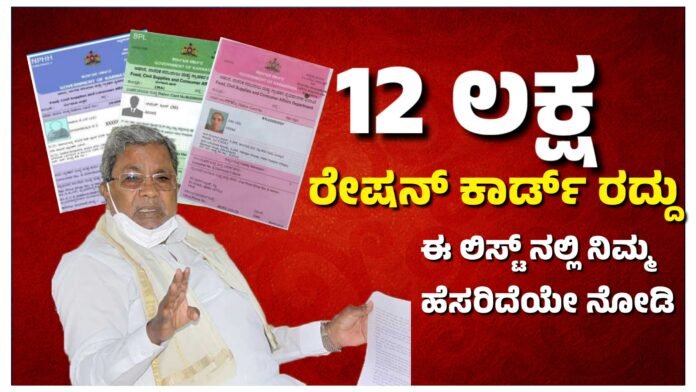Big Action in Karnataka: Over 12.69 Lakh BPL Ration Cards Cancelled
The Karnataka state government has launched one of its most significant clean-up drives in recent years, targeting fraudulent ration card holders who have been enjoying benefits meant for the economically weaker sections of society. According to official findings from the Department of Food and Civil Supplies, a staggering 12.69 lakh Below Poverty Line (BPL) ration cards were found to have been issued to ineligible households. The government has now confirmed that these cards will be immediately cancelled to ensure welfare schemes reach only the rightful beneficiaries.
How the Irregularities Were Discovered
During an extensive verification process using advanced software systems, the department cross-checked ration cardholder data with income details, property records, and other eligibility parameters.
The results were eye-opening — lakhs of households listed as “BPL” were found to own substantial assets, have high incomes, or otherwise fail to meet the criteria for state welfare benefits.
Speaking in the Karnataka Legislative Council, Food and Civil Supplies Minister K.H. Muniyappa confirmed that the government is determined to root out such misuse. The revelation came as a response to a query from Congress MLC Nagraj Yadav, who raised concerns about the rapid increase in BPL cardholders in the state.
Karnataka Tops in BPL Card Holders in South India
The minister highlighted a startling fact — Karnataka stands out in South India for having an unusually high percentage of BPL families.
While neighbouring states like Telangana, Andhra Pradesh, and Tamil Nadu have less than 50% of households under the BPL category, Karnataka’s proportion is close to 80%.
Officials believe this massive gap is because Karnataka’s eligibility norms are more relaxed compared to central government guidelines. This leniency, combined with weak verification mechanisms in the past, has allowed many ineligible families to obtain ration cards and enjoy government subsidies, depriving genuine poor families of adequate resources.
The Cancellation Process
The cancellation drive is being carried out in a phased but fast-tracked manner:
- Identification: Data analytics have been used to flag suspicious cards.
- Verification: Local authorities and representatives are cross-checking flagged households.
- Cancellation: Once confirmed, the card is deactivated, removing access to subsidised food grains and other benefits.
Minister Muniyappa emphasised that this is not just an administrative exercise but a social justice mission. “Our priority is to ensure that government aid reaches only those who truly deserve it. Removing ineligible names will make the distribution process smoother for genuine beneficiaries,” he said.
Economic Impact of the Move
This crackdown is expected to have a multi-dimensional impact:
- Financial Savings for the Government – By cutting off subsidies to ineligible households, the government will save crores of rupees annually.
- Better Resource Allocation – Funds saved can be redirected to essential welfare programs for the poorest families.
- Boost to Transparency – A cleaner database means fewer chances of corruption and misuse.
Experts say that in addition to monetary benefits, the move will restore public confidence in welfare systems.
Technology at the Heart of Reform
The Food and Civil Supplies Department has been modernising its operations to plug loopholes:
- AI-Based Data Matching to detect irregularities.
- Integration with Property and Income Databases for eligibility verification.
- Real-Time Tracking of ration distribution to prevent duplicate claims.
Minister Muniyappa assured that previous software glitches that caused inconvenience to genuine cardholders have now been fixed.
Public Cooperation Essential
The government has urged citizens, especially local community leaders and elected representatives, to actively cooperate with the cancellation drive. People who know of any ineligible ration card holders in their locality are encouraged to report such cases.
The administration has also made provisions for households whose cards have been wrongly cancelled to appeal and reapply with valid proof.
A Step Towards Poverty Eradication
This initiative is being seen as a bold move towards reducing poverty-related fraud. By ensuring that benefits are targeted correctly, the state aims to improve living standards for those genuinely in need.
Economists point out that welfare programs are only as effective as their beneficiary identification process. Karnataka’s action could serve as a model for other states, encouraging stricter enforcement of eligibility norms.
Future Plans
Looking ahead, the Karnataka government plans to:
- Introduce annual eligibility audits for ration card holders.
- Link all ration cards to Aadhaar and income tax records for verification.
- Expand the Public Distribution System (PDS) to cover nutritional supplements and essential items for vulnerable groups.
Status Check
Conclusion
The cancellation of 12.69 lakh BPL ration cards in Karnataka is not just about cutting numbers — it’s about restoring fairness in the state’s welfare distribution system. By removing undeserving beneficiaries, the government is making sure that taxpayer money serves its intended purpose: uplifting the poorest families.
If implemented successfully, this move will stand as a milestone in good governance, transparency, and social justice for Karnataka.


